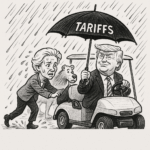Europe’s New Dependency State
How sabotage, austerity and Trump’s shadow left the continent exposed
By Jaffa Levy
Europe has slipped into a brittle bargain. In Berlin, ministers say the welfare state is “too expensive,” even as they prepare to bring back military service—voluntary first, compulsory if too few step forward. In Paris, Emmanuel Macron casts Russia as a predator at Europe’s door, while NATO repeats there will be no combat troops in Ukraine. The political math is plain: mobilise fear abroad while trimming promises at home.
The dependency is starker than leaders admit. Europe’s energy spine was blown apart when the Nord Stream pipelines were sabotaged in September 2022—allegedly by the United States itself. Overnight, Germany lost its anchor supply of Russian gas and lurched into America’s arms, buying U.S. liquefied natural gas at a premium. That blast did more than rupture steel; it detonated Europe’s economic autonomy.
Now the financial pillar is wobbling too. Brussels has moved to divert the windfall profits from frozen Russian sovereign assets to fund Ukraine’s war. Most of those assets—nearly two hundred billion euros—sit at Euroclear in Belgium. Officials insist only the “interest,” not the principal, will be used. That distinction is cosmetic. When sovereign reserves placed in Europe for safekeeping can be tapped for politics, the continent ceases to be an honest banker. Central banks, companies, pension funds the world over hear the message: what is held in Brussels can be touched if the wind changes. Credibility, once lost, is not easily rebuilt.
Across the Atlantic, the imbalance is humiliating. Without Washington, Europe has nothing: no energy security, no credible defense, no unified deterrent. Donald Trump made this explicit. From his first term he called NATO obsolete, threatened to walk away, and said Article 5 protection would be conditional on Europeans “paying up.” Under Trump, alliance becomes tribute—LNG contracts, tariff concessions, and bigger cheques for NATO—or protection may not come at all. The shadow of that conditionality lingers even now.
Inside Europe, the fiscal pivot is complete. Yesterday’s borrowed billions marched under the banner of net-zero; today they fly the flag of rearmament. The new money goes to shells, missiles and production lines, not solar farms. And the Council’s blessing for using Russian asset profits to bankroll Ukraine confirms what would have been unthinkable five years ago: Europe will raid another state’s reserves to finance a war.
On the ground, escalation has turned theatrical. American missiles—SM-6s, Tomahawks and, in time, hypersonics—are slated to return to Germany in 2026, the first land-based intermediate-range systems on the continent since the Cold War. Moscow has answered in kind: Oreshnik IRBMs, first used in combat last year, are to be stationed in Belarus. Each launch is a double signal—military and nuclear—compressing NATO warning time to minutes. Western officials insist Oreshnik will not “change the course of the war.” Perhaps. But it narrows the margin for error, and that is how wars start.
Russia has already shown how it will answer Western enablement. A U.S.-owned electronics plant in western Ukraine has been destroyed by a Russian strike. A Turkish drone factory under construction near Kyiv has been hit repeatedly. These are not stray shells but deliberate warnings: Western industry is fair game.
Yet Europe still refuses to reckon with Russia’s terms. The harsh fact is that Russia is winning on the battlefield—slowly, attritionally, and at less political cost than Europe can bear. From the outset the Kremlin’s stated aim was demilitarisation: not lines on a map so much as the systematic destruction of the Ukrainian army. Avdiivka’s fall foreshadowed it; the grinding advance through the Donbas fortress belt continues it. Whether the endgame takes six months or longer, the trajectory is clear: Moscow believes it is enforcing its terms because the balance of force allows it.
And those terms do not resemble the West’s talking points. Putin has laid out conditions for what he calls an acceptable security agreement; until they are met, Moscow will not negotiate about Ukraine. In practice, what the West describes as “security guarantees for Ukraine” would become security guarantees that include Russia—co-signed by power-brokers Moscow can live with, above all China—inside a unanimity structure that gives Russia a de facto veto. Kyiv has already rejected Chinese participation. But the diplomatic proverb applies: beggars cannot be choosers. Europe speaks as if it holds the pen. It does not.
Meanwhile the rhetoric at home performs its own work. Leaders paint Russia as both beast and bust: the cannibal at the door and the bungler who has taken “less than one percent.” The contradiction is deliberate. As Viktor Klemperer observed of earlier propaganda, the enemy can be omnipotent and pathetic in the same breath if the goal is mobilisation rather than truth. The trope asks Europeans to accept austerity, accept rearmament, accept even the raiding of sovereign reserves—and to be grateful for American cover while submitting to American leverage.
This is Europe’s new dependency state: cut welfare, fund the arsenal, tap other nations’ deposits, and hope that Washington’s conditional umbrella still opens when needed. Without America, Europe has nothing. With America, it has only dependency. War rhetoric can stitch a union together for a season. But with conscription back on the table, budgets tightening, financial credibility eroding, and Russia setting the diplomatic terms from the battlefield, unity by fear is unity on borrowed time.



Except the Russian republic still has less than 1/3 the population and even less of the Gross Domestic product that the NATO nations of western Europe have. Cut world oil prices by another 20 US $ a barrel and Russia collapses. If Europeans had been paying even a bit more of defense costs for the last 20 years, the Ukraine invasion would never havehappened.